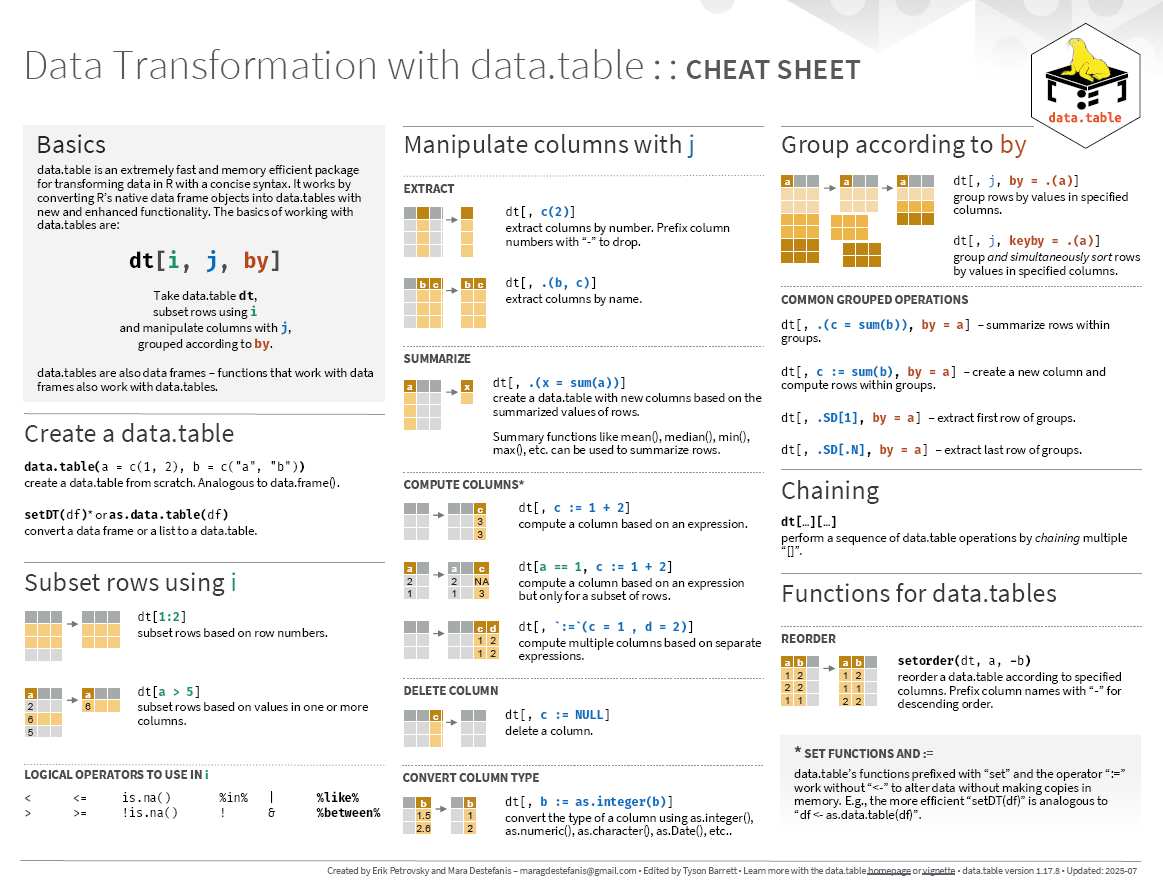The data.table 2023 community survey is now live! Click on https://tinyurl.com/datatable-survey to fill it out. The survey will remain open until December 1st, 2023.
In addition to filling out the survey, it would be great if you could share it with others who might be interested in participating.
data.table provides a high-performance version of base R's data.frame with syntax and feature enhancements for ease of use, convenience and programming speed.
- concise syntax: fast to type, fast to read
- fast speed
- memory efficient
- careful API lifecycle management
- community
- feature rich
- fast and friendly delimited file reader:
?fread, see also convenience features for small data - fast and feature rich delimited file writer:
?fwrite - low-level parallelism: many common operations are internally parallelized to use multiple CPU threads
- fast and scalable aggregations; e.g. 100GB in RAM (see benchmarks on up to two billion rows)
- fast and feature rich joins: ordered joins (e.g. rolling forwards, backwards, nearest and limited staleness), overlapping range joins (similar to
IRanges::findOverlaps), non-equi joins (i.e. joins using operators>, >=, <, <=), aggregate on join (by=.EACHI), update on join - fast add/update/delete columns by reference by group using no copies at all
- fast and feature rich reshaping data:
?dcast(pivot/wider/spread) and?melt(unpivot/longer/gather) - any R function from any R package can be used in queries not just the subset of functions made available by a database backend, also columns of type
listare supported - has no dependencies at all other than base R itself, for simpler production/maintenance
- the R dependency is as old as possible for as long as possible, dated April 2014, and we continuously test against that version; e.g. v1.11.0 released on 5 May 2018 bumped the dependency up from 5 year old R 3.0.0 to 4 year old R 3.1.0
install.packages("data.table")
# latest development version that has passed all tests:
data.table::update_dev_pkg()See the Installation wiki for more details.
Use data.table subset [ operator the same way you would use data.frame one, but...
- no need to prefix each column with
DT$(likesubset()andwith()but built-in) - any R expression using any package is allowed in
jargument, not just list of columns - extra argument
byto computejexpression by group
library(data.table)
DT = as.data.table(iris)
# FROM[WHERE, SELECT, GROUP BY]
# DT [i, j, by]
DT[Petal.Width > 1.0, mean(Petal.Length), by = Species]
# Species V1
#1: versicolor 4.362791
#2: virginica 5.552000- Introduction to data.table vignette
- Getting started wiki page
- Examples produced by
example(data.table)
data.table is widely used by the R community. It is being directly used by hundreds of CRAN and Bioconductor packages, and indirectly by thousands. It is one of the top most starred R packages on GitHub, and was highly rated by the Depsy project. If you need help, the data.table community is active on StackOverflow.
- click the Watch button at the top and right of GitHub project page
- read NEWS file
- follow #rdatatable on twitter
- watch recent Presentations
- read recent Articles
Guidelines for filing issues / pull requests: Contribution Guidelines.

